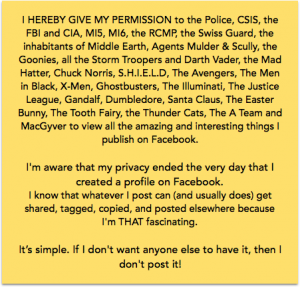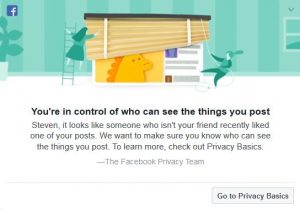The Illusion and Reality of Online Privacy; or, You’re Never Really In Control
I received a notice from Facebook that someone who was not a friend of mine had commented on one of my posts. The Facebook Privacy Team wanted to make sure that I knew who could see the things I posted in my timeline. To learn more, I was advised to check Privacy Basics. I didn’t bother.
Despite what the Facebook Privacy Team suggests, I have no illusion that I can realistically manage who sees anything that I post online. Therefore, I don’t even try to maintain privacy on Facebook through privacy settings. Everything I post is open to everyone.
This does not mean that I make no attempt to maintain privacy on Facebook or in other online venues. I maintain my online privacy daily by choosing not to post that which I want to remain private. For example, neither my husband’s name nor photograph has appeared on anything I have posted online. Although I am public in my teaching and writing, I choose to keep details of my family life private. The only way I can maintain privacy is to not post those details.
As a professor who is interested in digital literacy, I want my students to realize that they lose control of anything they post the moment that it is posted. Even if they quickly delete their posting, they cannot be sure that someone has not already captured it. To demonstrate how quickly this can happen, I show students how easy screen capture technology works; the technology I used to get a copy of the message sent to me by the Facebook Privacy Team. It took me less than 10 seconds to take control of the image which is now saved on both my laptop and my server.
There is nothing to stop me—except for my ethical code—from using the snipping tool to capture and repost anything I read in Facebook. The privacy settings or desires of the original poster cannot stop me. The same applies to anything posted online. If I can see something, I can easily capture and repost it.
 A Facebook friend recently requested that certain types of photographs they post are not shared; especially photographs of their children. The screen capture to the left is one such photograph. However, the image was not taken from my friend’s page, but the page of one of my friend’s relatives. I am not sure how the relative obtained the photograph, but it took less than 30 seconds for me to screen capture it, to edit the photograph to hide the images of the children, and to upload it to my server.
A Facebook friend recently requested that certain types of photographs they post are not shared; especially photographs of their children. The screen capture to the left is one such photograph. However, the image was not taken from my friend’s page, but the page of one of my friend’s relatives. I am not sure how the relative obtained the photograph, but it took less than 30 seconds for me to screen capture it, to edit the photograph to hide the images of the children, and to upload it to my server.
Although sharing someone else’s private postings is generally unethical, some of us are mandatory reporters who must legally share posts we read if they deal with certain topics. For example, if a Facebook friend posts that a professor at my college is treating them unfairly, I am required by law to report the allegation. In fact, the original poster might not even be a Facebook friend. Their posting might appear on my timeline if a mutual friend comments on it.
Professors are not the only people whose job requires them to be mandatory reporters when they read certain types of postings. There are no private rants online.
Even private messages are not safe. If, like me, you are a fan of Judge Judy, you already realize all too well how individuals can use private messages and photographs to shame their former friends. Claiming that something was a private correspondence does nothing after the information has already been shared by someone who no longer likes you.
 I am not arguing that we should ignore privacy settings on Facebook or other platforms on which they exist. My decision to just make everything public is not a decision I advocate for everyone. If someone wants to limit their postings to friends or family or some other group, I would encourage them to do so. But, it is important to remember that just because your privacy settings are up to date does not mean that you are really controlling who can see what you post.
I am not arguing that we should ignore privacy settings on Facebook or other platforms on which they exist. My decision to just make everything public is not a decision I advocate for everyone. If someone wants to limit their postings to friends or family or some other group, I would encourage them to do so. But, it is important to remember that just because your privacy settings are up to date does not mean that you are really controlling who can see what you post.
A recent meme by The Frida Factor rightly argues that “It’s simple. If I don’t want anyone else to have it, then don’t post it!” It’s good advice that is far more realistic that the message I received from the Facebook Privacy Team.
- –Steven L. Berg, PhD

Obviously we are not in control. It is all those neurons hopping from our basal ganglia to our cerebellum, our cerebral cortex , our amygdala….None of us has a central control spot calling the shots.